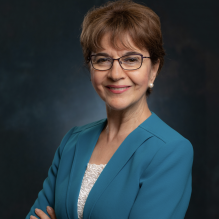Umit Ozkan
Distinguished Professor
Ohio State University
Department of Chemical & Biological Engineering
High-temperature Co-electrolysis of CO2 and H2O on Lanthanum Ferrite- Perovskite Cathodes
Abstract
A promising strategy to reduce the atmospheric CO2 levels is to convert CO2 into valuable chemicals and fuels. High-temperature co-electrolysis of H2O and CO2 is a promising way to produce clean syngas which is an important chemical building block. This scheme provides a potential CO2 mitigation route by converting this greenhouse gas into a valuable product, with pure oxygen being the only by-product. In this study, a high-temperature (700-850°C) solid electrolysis cell (SOEC) is used to co-electrolyze H2O and CO2 into syngas.
The SOEC employed in the present work consists of an yttria-stabilized zirconia (YSZ) solid oxide oxygen ion conducting electrolyte, sandwiched between two electrode layers. The counter electrode (anode) is a commercially available mixture of La0.8Sr0.2MnO3 and YSZ (LSM-YSZ), whereas the working electrode (cathode) consists of an in-house developed lanthanum ferrite-type perovskite oxide. H2O and CO2 get electrolyzed to H2 and CO at the cathode producing O2- ions, which travel through the YSZ electrolyte to the anode where they combine to form molecular oxygen.
The A- and B-site doped lanthanum ferrite perovskite materials used in this study as the working electrode were synthesized via EDTA-citric acid complexation method. The synthesized materials were characterized ex-situ, in-situ and operando using X-ray diffraction (XRD), X-ray photoelectron spectroscopy (XPS), X-ray absorption spectroscopy (XAS), Raman spectroscopy, transmission electron microscopy and four probe DC van der Paw techniques to investigate their morphology, bulk and surface structure, electrical conductivity and the changes in these properties during the electrochemical reaction under bias, including exsolution of B-site metal(s) to the surface. The electrocatalytic activity tests showed that the H2/CO ratio in the product stream can be tuned through modifications on the A- and B-site doping as well as through other reaction parameters.
Bio
Umit S. Ozkan is a Distinguished University Professor and a College of Engineering Distinguished Professor at The Ohio State University. She received her Ph.D from Iowa State University in 1984 and joined the faculty of The Ohio State University in 1985. Between 2000 and 2005, she also served as the Associate Dean for Research in the College of Engineering. She held Visiting Scientist and Visiting Professor positions at the French Institut de Recherches sur la Catalyse (Catalysis Research Institute) Centre National de la Recherche Scientifique (CNRS) and Université Claude Bernard, respectively. Currently, she is the Chair of the Chemical and Biomolecular Engineering Department.
Her current research interests are focused on heterogeneous catalysis and electro-catalysis.
She has edited eight books, has written over 250 refereed publications and book chapters, given over 350 conference presentations and over 150 invited lectures in 20 different countries. She has eight patents and over 13,000 citations. Professor Ozkan has held and continues to hold many leadership positions in several professional organizations, including ACS, AIChE, and North American Catalysis Society. She is on the Editorial Boards of Catalysis Today, Journal of Molecular Catalysis, Catalysis Letters, Topics in Catalysis, The Royal Society of Chemistry Catalysis Book Series, Applied Catalysis B, ACS Applied Energy Materials, Catalysis Reviews in Science and Engineering, ACS Catalysis, Journal of Catalysis, and Nature Sustainability. Dr. Ozkan is a Professional Engineer registered in Ohio. She is a fellow of the American Association for the Advancement of Science (AAS), American Institute of Chemical Engineers (AICHE), and American Chemical Society (ACS).
Professor Ozkan is the recipient of many honors and awards among which are the North American Catalysis Burwell Lectureship Award (2023), ACS Henry H. Storch Award (2017), ACS Energy and Fuels Distinguished Researcher Award (2012), John van Geuns Lectureship Award at the Van't Hoff Institute at the University of Amsterdam (2010), Iowa State University, Professional Achievement Citation in Engineering (2010), AIChE Mentorship Excellence Award (2009), Fulbright Senior Scholar Award (2007), the Society of Women Engineers Achievement Award (2002). In 2013, she was honored by a special volume of Topics in Catalysis. The volume included contributions from 35 different research groups from 12 different countries. In 2019, she was again honored, this time by a special volume of Catalysis Today.
In her research group, Dr. Ozkan has advised and mentored over 100 graduate students, post-doctoral researchers and honors students.
Wednesday, October 04, 2023

Umit Ozkan
Distinguished Professor
Department of Chemical Engineering
Ohio State University
- Time: 11:00 AM
- Location: 206 Furnas Hall